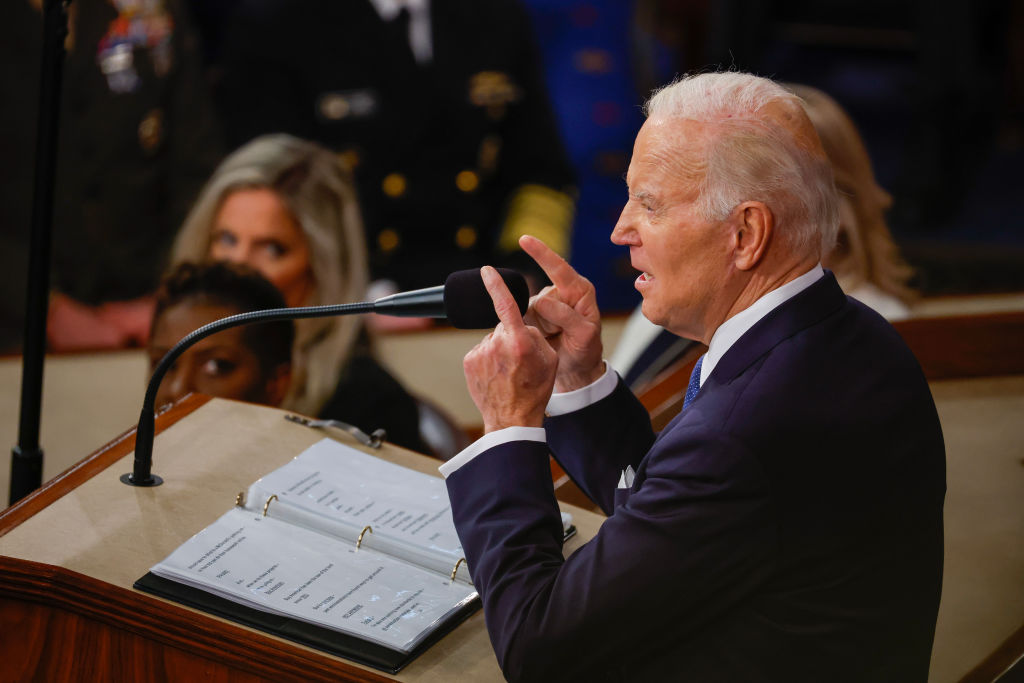Biden Calls for Stronger Antitrust Laws to Rein In Big Tech Following Schumer Block on Latest Effort
President Biden delivers State of the Union address
President Biden delivers his State of the Union address in the Chamber of the US Capitol on February 7, 2023 in Washington, DC. Photo credit – Chip Somodevilla – Getty Images
In his first State of the Union address since Republicans won a narrow majority in the House of Representatives, President Joe Biden called on Congress to take up an issue where there is growing bipartisan dynamic but powerful obstacles standing in the way: the Strengthening of American antitrust laws that can be cracked down on Big Tech’s monopoly power.
“Pass bipartisan legislation to strengthen antitrust enforcement and prevent big online platforms from giving their own products an unfair advantage,” Biden told lawmakers Tuesday night, citing American Innovation and Choice Online Act (AICOA). “Capitalism without competition is not capitalism,” he added. “It’s blackmail. It’s exploitation.”
Biden’s renewed push comes after Senate Majority Leader Chuck Schumer last year effectively quashed two bipartisan antitrust laws aimed at cracking down on platform monopolies. The New York Democrat, while saying he supports the measures and promising a vote on them for months, never got the word out on the package, even after the White House asked congressional leaders to pass the bills to Bidens during the post-halftime lame duck session Desk elections to send.
Schumer insisted the bills did not have the necessary votes to pass, disagreeing with the legislation’s chief architects, Sen. Amy Klobuchar, a Minnesota Democrat, and Sen. Chuck Grassley, an Iowa Republican. Grassley told TIME last fall that more than 20 Republicans were ready to vote for the package.
AICOA legislation would have barred dominant tech companies like Amazon and Google from favoring their own products over competitors who need to use their platforms to reach customers. A smaller accompanying bill, the Open App Markets Act (OAMA), would have forced Apple and Google to open their app stores to competing marketplaces. The two measures brought in strange bedfellows; They were supported by most Democrats in Congress — with the exception of the California delegation — and some of Capitol Hill’s most conservative Republicans, including Senator Josh Hawley of Missouri and Rep. Ken Buck of Colorado. Both bills passed the House and Senate Judiciary Committees with bipartisan margins. “It is very clear that we have the votes to pass these two bills in the House and Senate,” Rep. David Cicilline, a Rhode Island Democrat who authored the House version, told TIME over the summer.
Schumer, who as Senate Majority Leader controls which bills make it into the chamber, infuriated anti-monopoly campaigners by obstructing legislation — many of whom had long feared he was playing into big tech’s strategy, the Times said to lose.
For much of the last year, big tech lobby firms ran a multimillion-dollar publicity campaign to torpedo both bills, which some Hill sources suspect may have spooked some Democrats for a 2022 re-election that Pelosi wanted not subject its members to a difficult vote without the measures first passing the Senate, where the motion required a majority of 60 votes.
But with a divided government, it will be even more difficult to move the bills forward now. House Speaker Kevin McCarthy, a native Californian, opposes renewed enforcement of antitrust laws at the big tech companies. So does Rep. Jim Jordan of Ohio, the new chairman of the House Judiciary Committee, who counts Google as one of his biggest donors.
This increases the pressure on federal law enforcement agencies to take action against monopolistic companies and anti-competitive behavior over the next two years. That’s one reason Schumer allocated an additional $50 million to the Federal Trade Commission and $35 million to the Justice Department’s Antitrust Division last year, as consolation for never allowing a vote on the AICOA and OAMA bills has, according to several Hill sources familiar with the negotiations. Both agencies are run by anti-monopoly crusaders — the FTC’s Lina Khan and the DOJ’s Jonathan Kanter.
The Majority Leader also allowed an amendment to the spending law that would allow those agencies to immediately charge higher fees from companies they need to review proposed mergers, a move that is expected to help the FTC and DOJ in the next 10 years collectively raising about $1.4 billion years, according to a congressional adviser familiar with the process.
But while those resources will make a difference for the agencies — both the FTC and DOJ have fewer attorneys today than they did in the 1980s, meaning they’re often outnumbered by the corporate giants they’re up against in court — will unlikely to convince them Congress wants to change federal laws to make it harder for tech giants to abuse their gatekeeper status.
“To my Republican friends, if we could work together in the last Congress, there’s no reason we can’t work together in this new Congress,” Biden said Tuesday night. “People sent us a clear message. Fighting for the sake of fighting, power for the sake of power, conflict for the sake of conflict will get us nowhere.”
But when it comes to antitrust laws against big tech, it’s clear that Republicans aren’t Biden’s only obstacle.
Don’t miss interesting posts on Famousbio









